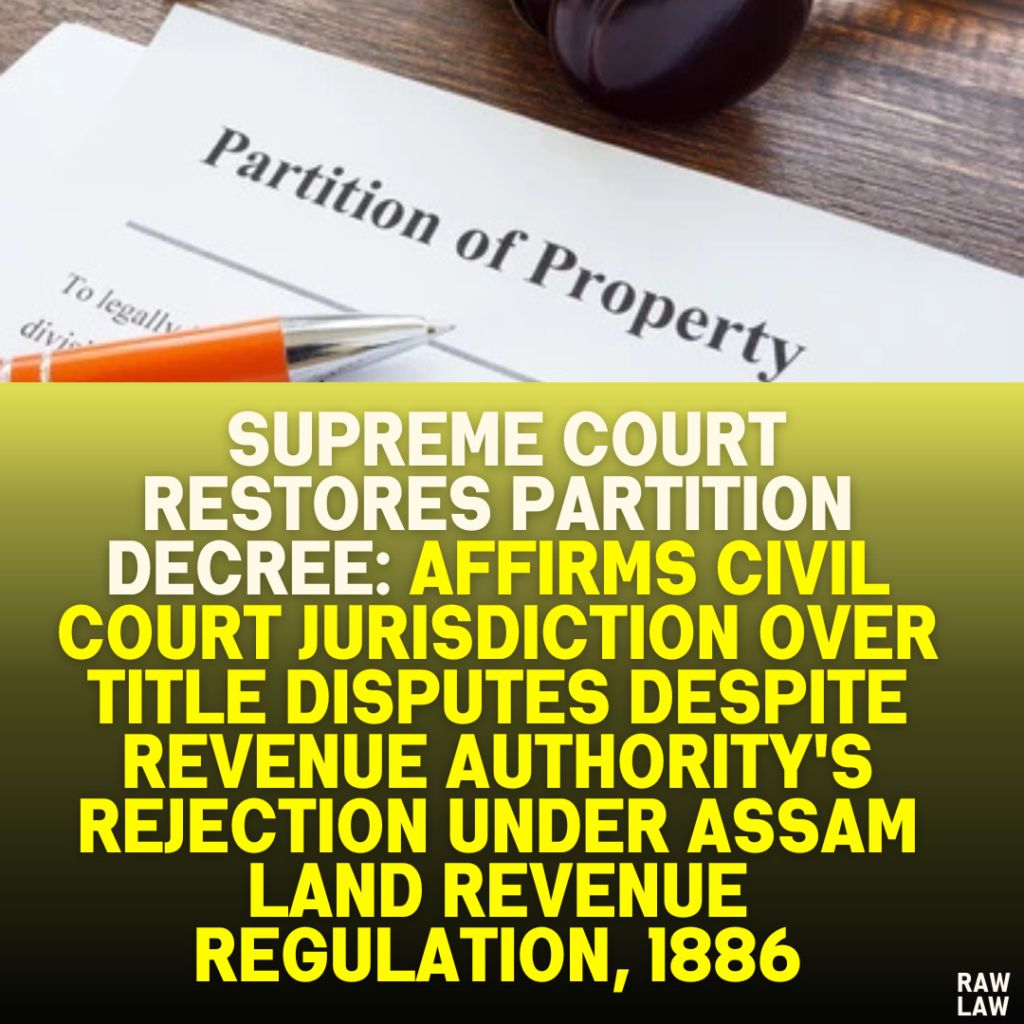Court’s Decision
The Supreme Court allowed the appeal, overturning the Gauhati High Court’s judgment and restoring the order of the Civil Judge. The Civil Judge had earlier decreed in favor of the appellant, granting partition and recovery of possession for his share in the disputed land. The Supreme Court held that the jurisdiction of civil courts is barred under Section 154(1)(e) of the Assam Land Revenue Regulation, 1886, only under specific conditions. Importantly, when revenue authorities cannot execute partition due to disputes over title, civil courts retain jurisdiction to decide such disputes.
Facts
- Ownership and Sale of Land:
- The appellant purchased land through two registered sale deeds in 1977.
- The seller sold a total of 1 katha and 5 lechas of land from a larger plot.
- Subsequent Disputes:
- After taking possession of the land, the appellant faced attempts by the sellers to dispossess him.
- In response, the appellant filed Title Suit No. 67/1979 for confirmation of his ownership and possession. While initially successful, the suit was dismissed after remand due to non-joinder of necessary parties.
- Attempts to Obtain Partition:
- The appellant sought partition through Title Appeal No. 59/1990. The appellate court ruled in his favor but noted that the appellant could not be delivered possession without seeking partition through appropriate remedies.
- Subsequently, the appellant filed a case for imperfect partition with revenue authorities under Section 97 of the Assam Land Revenue Regulation. This was rejected due to non-possession and lack of co-sharer consent.
- Civil Suit for Partition:
- The appellant filed Title Suit No. 83/2004 in civil court, seeking a partition decree. The trial court dismissed the suit, citing the jurisdictional bar under Section 154(1)(e).
- On appeal, the Civil Judge decreed in favor of the appellant, granting partition. The Gauhati High Court reversed this decision, holding that civil courts lacked jurisdiction under Section 154(1)(e).
- Appeal to the Supreme Court:
- Dissatisfied with the High Court’s decision, the appellant approached the Supreme Court.
Issues
- Whether the civil court had jurisdiction to entertain the partition suit despite the jurisdictional bar under Section 154(1)(e).
- Whether the appellant satisfied the conditions under Section 97 for imperfect partition through revenue authorities.
Petitioner’s Arguments
- Civil Court Jurisdiction:
- The appellant argued that Section 154(1)(e) bars civil court jurisdiction only when a claim for imperfect partition is otherwise maintainable under Section 97.
- Since the revenue authorities refused partition due to non-possession, the appellant claimed that civil courts retained jurisdiction to decide the dispute.
- Title Disputes:
- The appellant highlighted that revenue authorities are not empowered to decide title disputes, which fall exclusively within civil court jurisdiction.
- Absence of Remedies:
- The appellant emphasized that denying civil court jurisdiction would leave him without any remedy, contrary to principles of justice.
Respondent’s Arguments
- High Court Decision:
- The respondents supported the High Court’s decision, arguing that the jurisdictional bar under Section 154(1)(e) applied to the appellant’s case.
- Revenue Authority’s Role:
- They asserted that the revenue authorities rightly refused partition due to the appellant’s non-possession and lack of consent from co-sharers, as required under Section 97.
- Procedure Violations:
- The respondents accused the appellant of bypassing established procedures by directly approaching civil courts instead of appealing the revenue authority’s decision to higher revenue forums.
Analysis of the Law
- Section 154(1)(e):
- Bars civil courts from entertaining claims for imperfect partition except in cases where perfect partition is refused by revenue authorities under specific conditions (e.g., forming a separate estate liable for less than ₹5 revenue annually).
- However, this bar does not extend to disputes over title, which are the exclusive domain of civil courts.
- Section 97 Requirements:
- To seek imperfect partition under revenue laws, a claimant must:
- Be in actual possession of the property, and
- Secure the consent of co-sharers holding more than half the estate.
- The appellant failed to meet these conditions, leading to the rejection of his case by revenue authorities.
- To seek imperfect partition under revenue laws, a claimant must:
- Jurisdictional Overlap:
- Revenue authorities handle partition execution, but civil courts adjudicate disputes over title and shares. This dual jurisdiction is consistent with previous judgments.
- Precedents:
- Dhulabhai v. State of Madhya Pradesh: Civil court jurisdiction is excluded only when alternative remedies under special statutes are adequate.
- Rukeya Banu v. Nazira Banu: Revenue authorities handle partition execution, but disputes over title and shares fall under civil court jurisdiction.
Precedent Analysis
- Calcutta High Court (1928):
- Held that revenue-paying properties must be partitioned by revenue authorities, but civil courts retain jurisdiction over title disputes and share declarations.
- Gauhati High Court (2002):
- Clarified that civil courts can adjudicate title disputes even after revenue authorities perform partition.
Court’s Reasoning
- Title Disputes:
- Civil courts have the exclusive jurisdiction to decide disputes over ownership and shares in property, as revenue authorities are not competent to handle such issues.
- Bar Under Section 154(1)(e):
- The bar applies only when the prerequisites for partition under Section 97 are met, which was not the case here.
- High Court’s Error:
- The High Court misapplied the jurisdictional bar under Section 154(1)(e), denying the appellant access to a legitimate forum for resolving his title dispute.
Conclusion
The Supreme Court allowed the appeal, restored the appellate court’s decree, and directed the revenue authorities to implement partition as per the decree.
Implications
This judgment reaffirms the complementary roles of revenue and civil courts. While revenue authorities manage partition execution, civil courts have an irreplaceable role in resolving disputes over ownership and shares, ensuring no party is left without a remedy.
